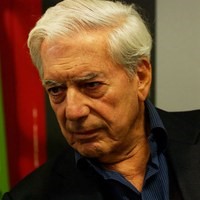Arequipa (Perú), 1936
By Flávio Aguiar
Claiming that three-quarters of his published work would not exist if it weren’t for his compulsive reading of newspapers, Vargas Llosa aligns himself with many novelists who are also journalists, like the Argentine Tomás Eloy Martínez. He draws inspiration from events across the continent to compose his books, such as La fiesta del Chivo (2000), which focuses on the dictatorship in the Dominican Republic.
His novel La ciudad y los perros (1963), which offers a sharp critique of Peruvian military officers, earned him international recognition. Despite spending long periods in Europe, he remains deeply interested in Latin America.
He has engaged in many controversies with intellectuals of various tendencies, widely covered by the press, including his debates with Gabriel García Márquez regarding the Cuban Revolution and its consequences. Initially sympathetic to the revolution, even serving as a juror for the Casa de las Américas Prize (1965), he ultimately distanced himself from it, as well as from leftist thought.
Navigating between literature and history, either witnessing or reporting reality, he finds in realistic language the material for his writing and avoids literary fads, a quality he shares with another notable Peruvian narrator, Julio Ramón Ribeyro. He is also an important chronicler, essayist, and playwright.
In 1990, he ran for the presidency of his country but was unsuccessful, a decision that brought him death threats. He was awarded the Nobel Prize in Literature in 2010.
He is one of the few Hispanic-American writers who have written about a Brazilian theme, the War of Canudos. Other notable works include Conversación en la catedral (1969), La guerra del fín del mundo (1981), O sonho do celta (2010), O herói discreto (2013), and the essays Saberes e Utopias (2009) and A civilização do espetáculo (2012).



